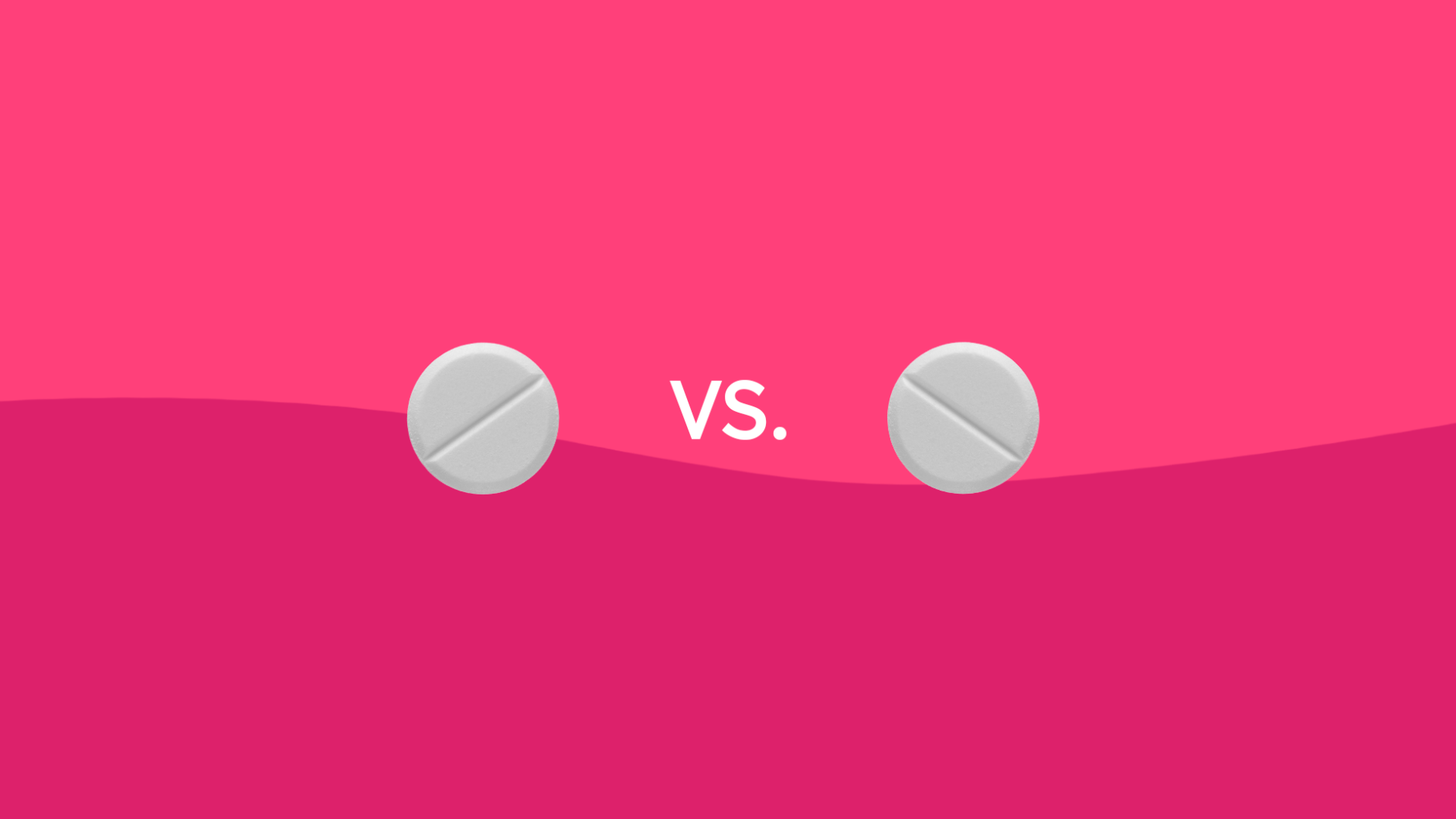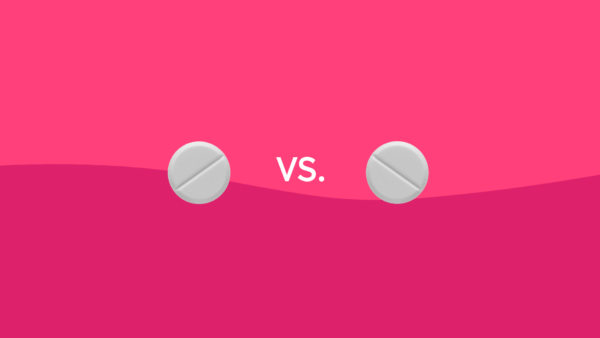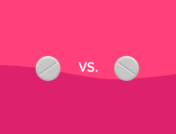Drug overview & main differences | Conditions treated | Efficacy | Insurance coverage and cost comparison | Side effects | Drug interactions | Warnings | FAQ
If you have experienced a heart attack or currently live with high blood pressure, your doctor may prescribe you a drug like metoprolol tartrate (Lopressor) or metoprolol succinate (Toprol XL). Although both drugs contain identical active ingredients, they may be used in different ways.
Both metoprolol tartrate and metoprolol succinate belong to a class of drugs called beta blockers. They are sometimes also known as beta-1 selective adrenoceptor blockers and beta antagonists.
These drugs work by blocking the effects of hormones such as epinephrine and norepinephrine in the sympathetic nervous system. The sympathetic nervous system is responsible for the typical “fight-or-flight” response. Metoprolol can help reduce stress on the heart, relax blood vessels to decrease blood pressure, and alleviate chest pain.
What are the main differences between metoprolol tartrate and metoprolol succinate?
The main difference between metoprolol tartrate (What is metoprolol tartrate?) and metoprolol succinate (What is metoprolol succinate?) is in their formulations. Metoprolol tartrate is the immediate-release version of metoprolol while metoprolol succinate is the extended-release version. This means that metoprolol succinate is released over time in the body leading to longer-acting effects.
Metoprolol tartrate may need to be taken multiple times per day. Metoprolol succinate can be taken once daily since it lasts longer than the tartrate form. Metoprolol succinate can also be used in children aged 6 years and older whereas metoprolol tartrate can only be used in adults.
| Main differences between metoprolol tartrate and metoprolol succinate | ||
|---|---|---|
| Metoprolol Tartrate | Metoprolol Succinate | |
| Drug class | Beta blocker | Beta blocker |
| Brand/generic status | Brand and generic version available | Brand and generic version available |
| What is the brand name? | Lopressor | Toprol XL |
| What form(s) does the drug come in? | Oral tablet | Oral tablet, extended-release |
| What is the standard dosage? | 100 mg to 400 mg daily in divided doses | 100 mg once daily |
| How long is the typical treatment? | Short-term or long-term use as directed by a physician | Short-term or long-term use as directed by a physician |
| Who typically uses the medication? | Adults | Adults and children 6 years and older |
Want the best price on metoprolol tartrate?
Sign up for metoprolol tartrate price alerts and find out when the price changes!
Conditions treated by metoprolol tartrate and metoprolol succinate
The tartrate and succinate forms of metoprolol are FDA-approved to treat high blood pressure (hypertension) and chest pain (angina pectoris).
Metoprolol tartrate is also FDA-approved as treatment right after a heart attack (acute myocardial infarction). Taking metoprolol tartrate after a heart attack may help reduce the risk of further cardiovascular events and death especially in those with coronary artery disease. Treatment should usually start within 3 to 10 days after the heart attack.
In addition to high blood pressure and chest pain, metoprolol succinate is also FDA-approved to treat congestive heart failure. More specifically, metoprolol succinate treats chronic heart failure that is New York Heart Association class II or III. Given as a daily dose, metoprolol succinate can improve outcomes and decrease the risk of mortality in heart failure patients.
Off-label uses for metoprolol include supraventricular tachycardia (abnormally fast heart rate) and thyroid storm (a dangerous condition that results from the overproduction of thyroid hormone). Other off-label uses may include treatment for abnormal heart rhythm (arrhythmia) and performance anxiety.
| Condition | Metoprolol Tartrate | Metoprolol Succinate |
| High blood pressure | Yes | Yes |
| Chronic chest pain | Yes | Yes |
| Acute heart attack | Yes | Off-label |
| Heart failure | Off-label | Yes |
| Supraventricular tachycardia | Off-label | Off-label |
| Thyroid storm | Off-label | Off-label |
| Arrhythmia | Off-label | Off-label |
| Performance anxiety | Off-label | Off-label |
Is metoprolol tartrate or metoprolol succinate more effective?
Metoprolol tartrate and metoprolol succinate are both similar in effectiveness for treating high blood pressure and chronic chest pain. However, metoprolol tartrate may be more effective as a treatment for acute heart attacks while metoprolol succinate may be more effective as a treatment for chronic heart failure.
Clinical trials have shown that metoprolol tartrate is effective for high blood pressure and preventing adverse outcomes after a heart attack. On the contrary, studies including the Merit-HF trial have shown that metoprolol succinate is superior to metoprolol tartrate for chronic heart failure.
Metoprolol succinate can decrease recurring hospital visits and death from heart failure. However, carvedilol, another common beta blocker, might be even more effective than metoprolol succinate, according to a trial published in the Lancet.
Because metoprolol tartrate is taken multiple times throughout the day, drug levels in the body may not be as consistent. This could result in more side effects and less tolerability compared to the extended-release succinate form. One analysis found that side effects such as a slow heartbeat (bradycardia) may be more likely to occur with immediate-release metoprolol tartrate.
Coverage and cost comparison of metoprolol tartrate vs. metoprolol succinate
Metoprolol tartrate can be purchased as a generic prescription drug that is usually covered by Medicare and other insurance plans. Without insurance, the average cash price for generic metoprolol tartrate is around $5. SingleCare discount cards can be used at participating pharmacies to reduce the cost of this drug. You may find a price closer to $4 with a savings coupon.
Metoprolol succinate or extended-release metoprolol is available as generic medication that is covered by most Medicare and insurance plans. Generic metoprolol succinate is more likely to be covered than the brand name Toprol XL. The average retail price for generic Toprol XL is around $56. Check with your pharmacy to see if you can save more with a SingleCare savings card. If accepted, you can reduce the cost to $9.
| Metoprolol Tartrate | Metoprolol Succinate | |
| Typically covered by insurance? | Yes | Yes |
| Typically covered by Medicare? | Yes | Yes |
| Standard dosage | 50 mg tablets | 100 mg tablets |
| Typical Medicare copay | $0-$65 | $0-$20 |
| SingleCare cost | $4 | $9 |
Get the pharmacy discount card
Common side effects of metoprolol tartrate vs. metoprolol succinate
Metoprolol tartrate and metoprolol succinate can cause similar side effects. The most common side effects of metoprolol include fatigue or tiredness, dizziness, depression, shortness of breath (dyspnea), and slow heartbeat (bradycardia). Other side effects include diarrhea, nausea, vomiting, and dry mouth.
Hypersensitivity reactions such as rash or itching may also occur when taking either form of metoprolol. Based on the FDA label, metoprolol tartrate may be more likely to cause certain side effects.
| Metoprolol Tartrate | Metoprolol Succinate | |||
| Side Effect | Applicable? | Frequency | Applicable? | Frequency |
| Fatigue | Yes | 10% | Yes | >2% |
| Dizziness | Yes | 10% | Yes | >2% |
| Rash | Yes | 5% | Yes | >2% |
| Depression | Yes | 5% | Yes | >2% |
| Diarrhea | Yes | 5% | Yes | >2% |
| Shortness of breath | Yes | 3% | Yes | >2% |
| Slow heartbeat | Yes | 3% | Yes | >2% |
| Dry mouth | Yes | 1% | Yes | *not reported |
| Nausea | Yes | 1% | Yes | * |
| Heartburn | Yes | 1% | Yes | * |
| Constipation | Yes | 1% | Yes | * |
This may not be a complete list. Consult your doctor or pharmacist for possible side effects.
Source: DailyMed (metoprolol tartrate), DailyMed (metoprolol succinate)
Drug interactions of metoprolol tartrate vs. metoprolol succinate
Metoprolol tartrate and metoprolol succinate can interact with many of the same medications. Other drugs that have similar actions or affect the metabolism of beta blockers can interact with both forms of metoprolol.
Metoprolol should not be taken with catecholamine-depleting drugs. Taking these drugs together may increase the effects of beta blockers and cause adverse events such as low blood pressure (hypotension) and slow heartbeat (bradycardia). Other adverse effects may include dizziness and fainting.
Metoprolol is heavily processed by the CYP2D6 enzyme. Therefore, drugs that inhibit this enzyme can cause increased metoprolol levels in the body. Increased metoprolol levels can increase the risk of adverse effects.
Digoxin and drugs called calcium channel blockers may have additive effects when given with metoprolol. Taking any of these drugs with metoprolol can cause side effects in the heart.
| Drug | Drug Class | Metoprolol Tartrate | Metoprolol Succinate |
| Reserpine Tetrabenazine |
Catecholamine-depleting drug | Yes | Yes |
| Quinidine Fluoxetine Fluvoxamine Sertraline Bupropion Paroxetine Propafenone Haloperidol Diphenhydramine Hydroxychloroquine Terbinafine |
CYP2D6 inhibitor | Yes | Yes |
| Digoxin | Cardiac glycoside | Yes | Yes |
| Diltiazem Verapamil |
Calcium channel blocker | Yes | Yes |
| Clonidine Guanethidine Betanidine |
Alpha-adrenergic agent | Yes | Yes |
This may not be a complete list of all possible drug interactions. Consult a doctor with all the medications you may be taking.
Warnings of metoprolol tartrate and metoprolol succinate
Both metoprolol tartrate and metoprolol succinate should not be discontinued abruptly. If treatment with metoprolol is stopped abruptly, some people may experience a higher risk of heart attack, abnormal heart rhythm, and chest pain. The risk of these events is higher in those with underlying heart disease.
Beta blockers like metoprolol should not be used in anyone with the following conditions:
- Severe bradycardia
- Heart block greater than first degree
- Cardiogenic shock
- Decompensated heart failure
- Sick sinus syndrome without a pacemaker
- Hypersensitivity to any ingredients in these drugs
Consult a doctor to see if you may have any of these conditions before starting treatment.
Beta blockers can mask the signs and symptoms of hypoglycemia, or low blood sugar. Those with diabetes may need to monitor their blood sugar while taking beta blockers.
Frequently asked questions about metoprolol tartrate vs. metoprolol succinate
What is metoprolol tartrate?
Metoprolol tartrate is the generic name for Lopressor. It is a beta blocker used to treat high blood pressure and chronic chest pain. It is also approved for the treatment of an acute heart attack to lower the risk of mortality.
What is metoprolol succinate?
Metoprolol succinate is also known by the brand name Toprol XL. It is the extended-release form of metoprolol. Metoprolol succinate is approved to treat high blood pressure, chronic chest pain, and congestive heart failure.
Are metoprolol tartrate and metoprolol succinate the same?
No. Metoprolol tartrate is an immediate-release tablet while metoprolol succinate is an extended-release tablet. They may be used in different ways.
Is metoprolol tartrate or metoprolol succinate better?
Metoprolol tartrate and metoprolol succinate are both effective depending on the condition being treated. Metoprolol succinate is more effective for treating heart failure. Metoprolol succinate may also be less likely to cause some side effects.
Can I use metoprolol tartrate or metoprolol succinate while pregnant?
Metoprolol should only be used during pregnancy if the benefits clearly outweigh the risks. Not enough studies have been done to show that these medications are 100% safe during pregnancy. Consult a doctor if you are pregnant or breastfeeding.
Can I use metoprolol tartrate or metoprolol succinate with alcohol?
Drinking alcohol while taking metoprolol may increase the risk of drowsiness and dizziness. It is not generally recommended to use metoprolol with alcohol.
Can you switch from metoprolol tartrate to succinate?
In some cases, metoprolol tartrate may be switched to metoprolol succinate. Metoprolol succinate may be preferred for its once-daily dosing. Consult a doctor to determine your treatment options when switching medications.
When should you not take metoprolol?
Metoprolol should not be taken if you experience very low heart rates, low blood pressure, or severe heart failure. It is important to discuss your medical history with a doctor to determine if you should be on metoprolol.
What should I avoid while taking metoprolol?
Alcohol and certain medications should be avoided while taking metoprolol. Some medications including calcium channel blockers, certain antidepressants, and those processed in a similar way as metoprolol may increase the risk of adverse effects with metoprolol.
Is metoprolol a high-risk medication?
Yes. Metoprolol may be considered a high-risk medication. When used improperly, metoprolol can cause significant harm.





